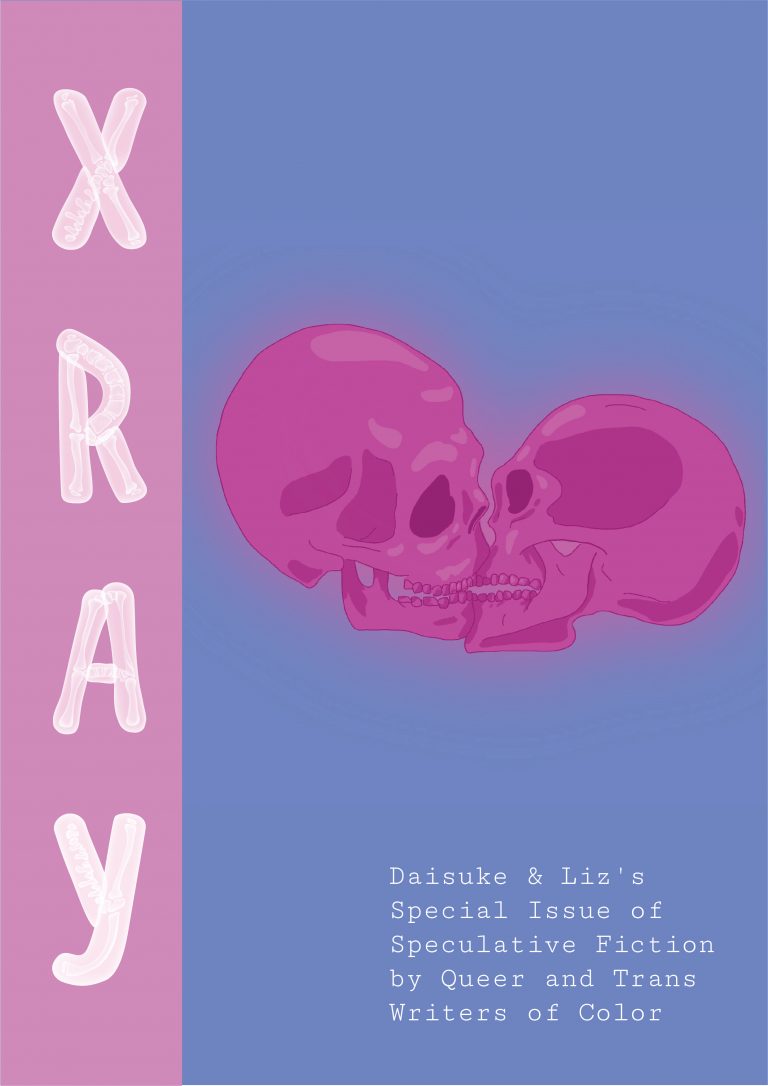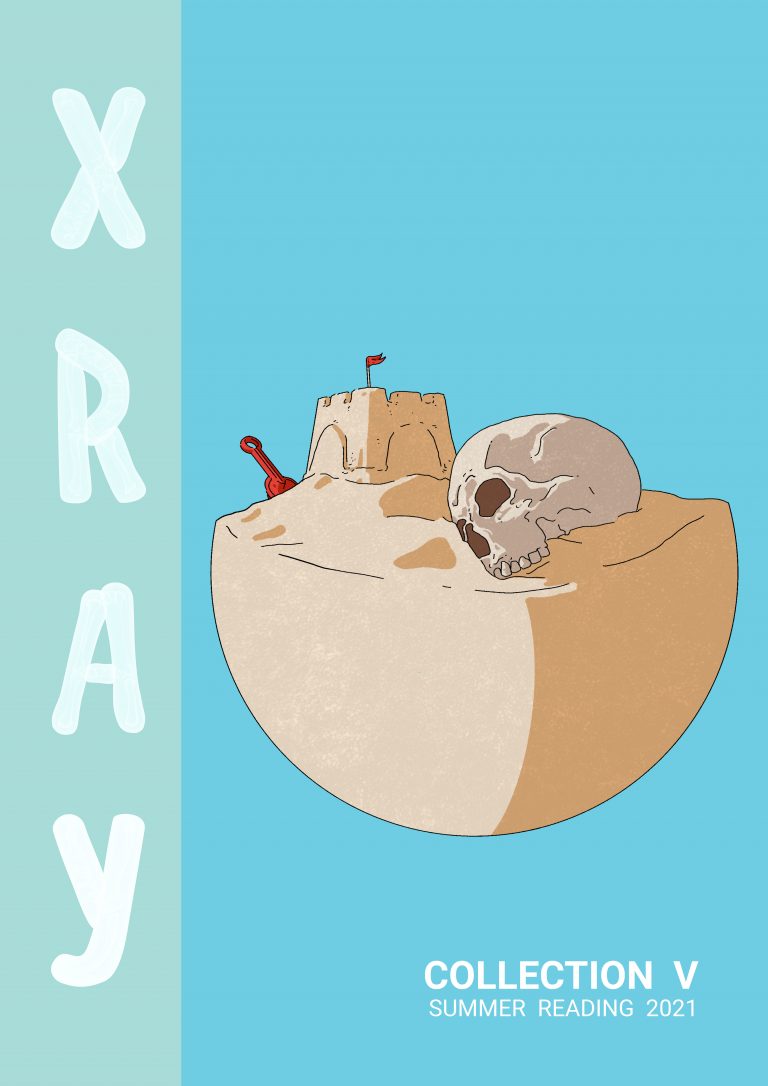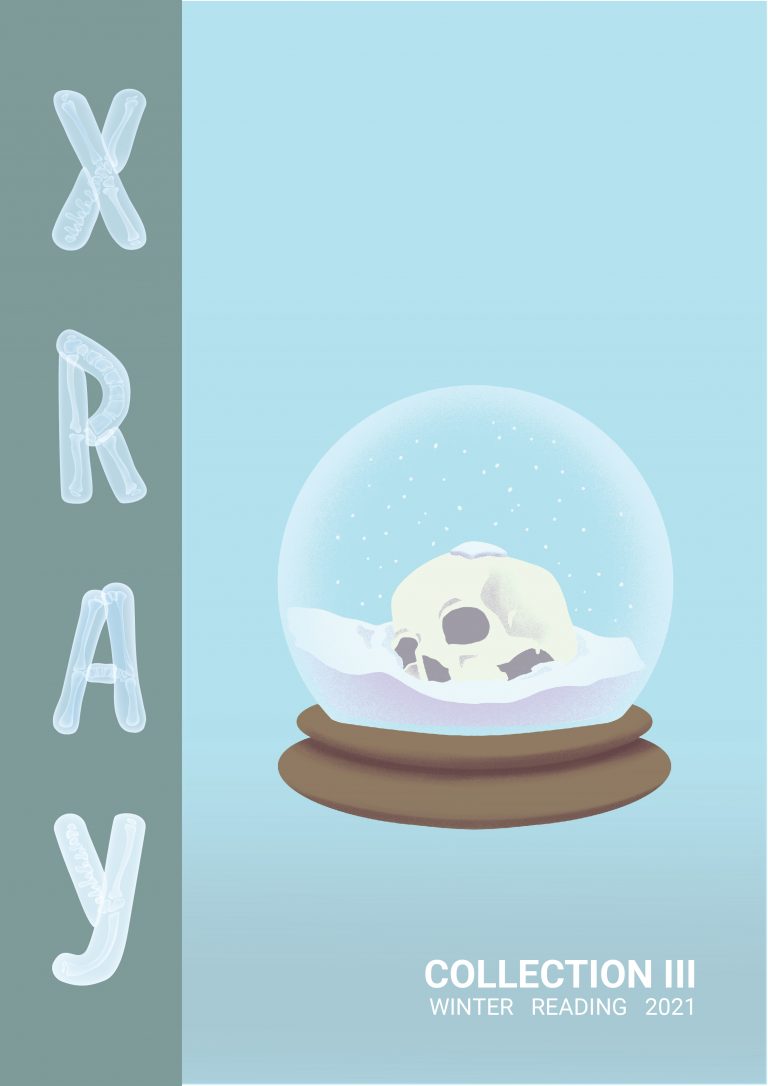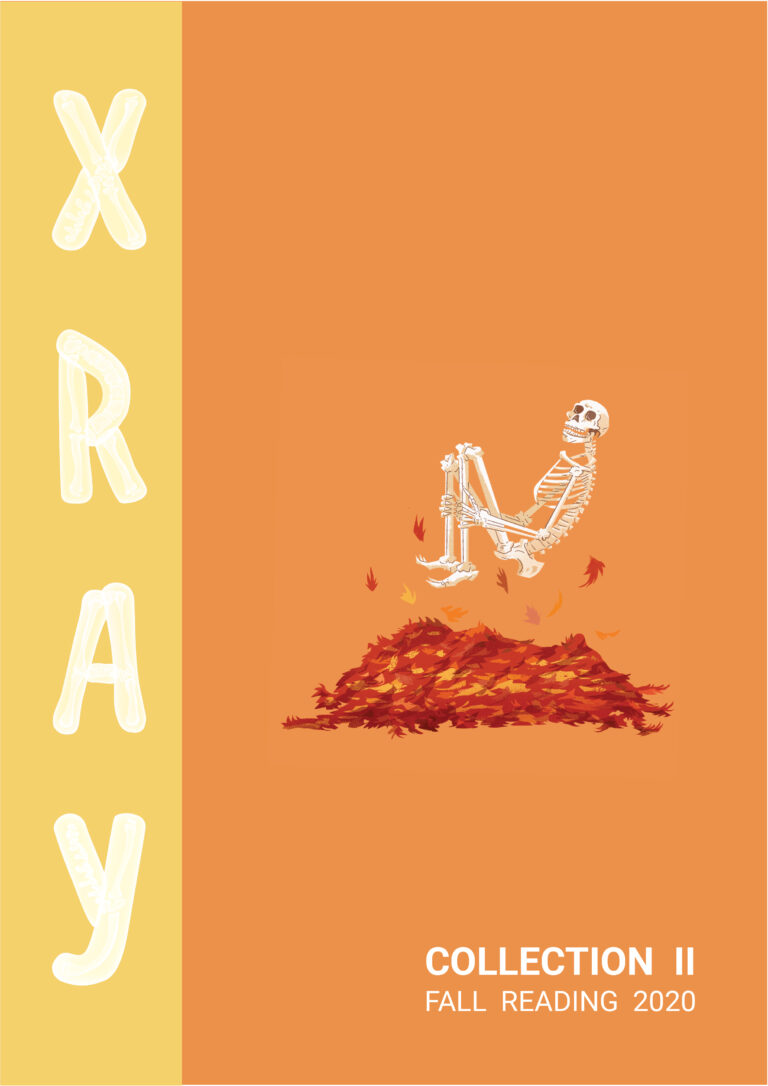
Fiction
PARROT by László Darvasi, translated from Hungarian by Ági Bori
As was his habit, he lay down for an afternoon nap, although next door they were building a church. The sounds of drills, hammers, and other tools kept waking him up. He fumbled his way to the kitchen, drank two glasses of absinthe in quick little swigs, plopped back in the armchair, and stared at the ceiling. Up there, the light was moving back and forth, forming streaks and patches, devouring itself. They were puttering around next door, and he remembered that the foreman had once said to the workers that not all of them would live long enough to see the completion of the church. He was a slim and sinewy man; he smoked while he talked; he lit up a few cigarettes. He watched him from the balcony, then eventually he reached for a cigarette, too. The workers should remember, the foreman explained, that there are sanctuaries and churches whose construction lasted five hundred years. Think of the many churches in the world that are up and running, but they’ll never be finished. They’re not yet finished, but services are already taking place in them. The workers should remember that a church might never be truly finished. And when it is finished, does everyone get there in the end? No. Not everyone gets to the church they plan to go to. Because along the way they get lost, find another church, take a different path, get sick, die.The workers then began to ask questions.“Then why bother building it?”“I don’t know,” the foreman said. “They’re paying us, aren’t they?”They are. That’s true. If they weren’t paying, they would quit for sure. But because they’re paying them, they’re working. Then one of the workers asked a strange question:“Could a prayer be ever finished?!”“Perhaps if it’s genuinely heard,” the foreman replied, but he already regretted saying it.The man thought that once services were being held, he’d go over there to pray too, perhaps get down on his knees, and ask the Lord not to let the bird land on his windowsill anymore. Is that what he really wanted though? The window was open, and if he were to close the window panes, he’d suffocate. The heat was unbearable. At least with the window open, there was a small draft. He got up from the armchair, and looked back to see what kind of imprint his body left behind. He turned the radio on, and the scratchy sounds, emitted with each turn of the button, also sounded like a prayer. He listened to the news. Another catastrophic mine accident somewhere. The hot spell was here to stay. A protest was underway. The man turned the radio off. He drank another glass of absinthe, opened a can of beer, and watched the slowly disappearing brownish foam; by then, the bird was already standing on the windowsill. Truth be told, it usually dirtied it up and, once again, it pooped right there.The men below were puttering around.The bird was the town’s parrot, it flew from window to window, no one knew who its owner was, whose cage it escaped from. Someone might have let him go, shoo, fly away, we don’t want you anymore, bird. He thought it might have stayed around this area because of the construction of the church; maybe it was fascinated by the sounds of drills, chisels, hammers. The temperature was so high that the dripping sweat boiled on the temples. The city was suffocating, windows everywhere were wide open, as if they were human mouths. Large, hungry mouths, breathing in the heat and exhaling human vapor, the scent of dust falling from the leaves of indoor plants, the stale smell of furniture. The curtains, like souls ready to escape their imprisonment, swayed back and forth. The parrot was an exceptionally intelligent being.Its small colorful head tilted left and right, it listened, it eavesdropped. It picked up and learned the intimate whispers and shouts that circulated in each home, then it moved on. In the next home it repeated what it heard earlier. Sometimes the parrot told the man, stay with me.“Stay with me.”“Go away.”“You’re not enough.”“You’re too much.”The parrot whispered, be nice, be nice.“Let’s dance, darling.”The bird acted out how the church was being built. It imitated the drilling, the chiseling, the loud hammering, as though it were an echo. After a while it flew away, the man wiped off the yellow poop from the windowsill, and emptied another glass of absinthe down his gullet. He sat down, stared upward, and gave names to the cracks on the ceiling. He spotted a spider. He might have even dozed off. That’s when the doorbell rang. It was the foreman from the construction site, with a cigarette hanging from his mouth. His face looked tormented. They had exchanged a few words before, back when the construction started. He was now holding a bag in his hand, said hello, and asked to come in for a moment. He had something to say. The man nodded, of course, and stepped aside. The foreman accepted the glass of absinthe and lit up another cigarette. “This is how we pray,” he said “during work.” “We never get to the end of our work, but we pray regardless.”The bag was still in his hand.“I see,” the man nodded. “Did the parrot used to visit you, too?”“I never chased it away. Sometimes I might have even waited for it,” the man nodded.“Do you know what one of my workers said? He said that the bird is the voice of history.”“That might be a bit of an exaggeration,” the man said, and he poured another glass. They clinked their small, but thick glasses.“While we were working on our construction site,” the foreman said, “the bird kept repeating a woman’s name. In your voice. We couldn’t work because of it.”“You couldn’t work because of a name?”The foreman didn’t answer.“It was so ridiculous. The youngsters, the younger workers, they kept laughing,” he said as he wiped his forehead. “Don’t be angry with me, but it couldn’t go on any longer.”“I see,” the man nodded. “Don’t be angry with me, you all.”“Here you go,” the foreman said, and he slowly lowered the bag on the table. He chugged another glass of absinthe and left. He didn’t say goodbye. His steps echoed in the stairway, although during such heat waves stairway noises usually sound muffled. Blood seeped through the brown pastry bag. They must have caught it by hand, and then wrung its neck. The man placed the carcass on the windowsill, right where it pooped a few hours ago, and then, as had been his habit for some time, he began to talk to it.
July 15, 2025

Fiction
POCKET UNIVERSE by D.T. Robbins
I find a pocket universe in my apartment building. A whole ass other universe two floors below me! On the 23rd floor to be exact. You’d never know it was a pocket universe by looking at it. From the outside, it just looks like another normal door to another normal apartment. The pocket universe feels like it’s made for me. Like its dark energy and matter and various particles all exploded from the nethermost parts of my soul during its creation or my creation, or maybe they happened simultaneously and that’s how love works. The first night that I’m in my pocket universe, I sleep. That’s it. I sleep the best sleep I’ve had in years. No alarms. No construction outside my window. No neighbors fucking so loudly that I get a little jealous but also a little horny. Just the purest form of rest known to man. I wake up to a fresh cup of coffee just the way I like it on the nightstand with a little note that says: Good morning. I love you. At sunset, I walk through the field of black velvet petunias and watch how the rays of light bounce off the petals and bounce upward to illuminate the coming stars and my heart bounces around in my chest and wow wow wow, look at how beautiful everything is!I tell my pocket universe everything: how stupid my boss is, why I chose to wear whatever I chose to wear that particular day, how my diet is/isn’t going, my working theory that anyone who drives a KIA is a bad driver and anyone who drives a BMW is an asshole—everything! My pocket universe listens and laughs and through signs and wonders lets me know if I'm right or if I’m being judgmental. It’s not long until I pack up most of my shit and move into my pocket universe, only going back to my home universe when I need to water my plants or get a haircut or see how the San Diego Padres are doing this season or something. I work remotely, and my pocket universe has great WiFi, so I’m still able to make money even though I don’t have to pay for rent or gas or groceries anymore. My pocket universe provides everything for me free of charge. Nights are spent by the ocean, drinking coffee stouts with the dolphins. Mornings are spent having friendly debates on various topics with the redwood trees and the skyscrapers while scarfing down the best fucking breakfast burritos I’ve ever had. In the fleeting moments, I stare at the sun because here it doesn’t blind you. Here, it illuminates the version of you that you’ve always wanted to be. The version of you you’d always hoped was somewhere inside of you. It shines its light on that part of you like a miracle, and you start to believe.
***
I notice it in the sky first, like slender cracks in glass slowly crawling from one end of the horizon to the other. My pocket universe tries to convince me that everything is fine. That it’s not a big deal, nothing to worry about. The water is next. Once clear and pure, it muddles and is soon overrun with leeches. The sun dims from brilliant gold to a metallic gray. Still, my pocket universe tells me it’s okay. That it will pass soon enough, that it’s just grateful I’m here. I tell it I’m just as grateful. That I love it too. That I love it more than words can express. That no story or song or poem or picture or suicide pact or anything could ever express. That’s when the crimson in my veins turns black. My skin pales as the dark lines stretch along every inch of my body. I lose sight in one eye, and my lungs only take half their normal amount of air. Every breath feels suffocating. “I’m killing you by staying here,” I say. “Maybe I don’t belong here. Maybe I was wrong. What did I do? Why is this happening?”The mountains explode. Fire mushrooms up and rolls out like tidal waves across the canvas of sky, setting my pocket universe itself on fire. Stars crash down around me. My pocket universe whispers in my ear, “I’m so sorry,” and I black out. I’m lying on the floor of the hallway, covered head to toe in ash and soot. The door to my pocket universe expands and retracts as though taking its last breaths. I reach for the doorknob, try to force myself back in. I’m thrown into the air like a fucking rag doll, past the other doors in the hallway that lead to regular apartments and not pocket universes, and into the elevator. The doors slam shut, and I’m sent back to my floor.***
Every morning and night, I walk past the door that leads to my pocket universe. The cracks in the wood heal in a matter of days, weeks, months until it’s as good as new. I heal, too. But I know I can never go back to my pocket universe. That if I do, it’ll kill us both. For whatever reason. It doesn’t matter, I guess. It just is. Instead, I lie in bed at night and dream of my pocket universe. Of its beauty and its brilliance and its whole ass existence being a miracle. And in my dreams, in my mind, I find a new pocket universe for me and my pocket universe to be together. One that hopefully won’t kill us both. July 14, 2025

Fiction
JITTERBUG JOHNNY by Grey Traynor
Jitterbug Johnny made it to the back of a dozen trucks and sports utility vehicles in the form of a sticker: “Jitterbug Johnny 1965-2023 – ‘Drive faster than an eagle takes flight!’” Jitterbug said the phrase any chance he could: before and after taking a shot, getting out of cold above-ground pools, even while receiving the toothiest blow job.However, it was a phrase that bothered some folks, sticking in their ear like a stubborn wad of wax. Did eagles take to flight faster than most other birds, they would wonder, shouldn’t this pithy encouragement have more to do with eagles soaring unparalleled heights rather than the immediacy with which they took off?These were understandable questions to ask of a man who also drove a beat-up sedan that couldn’t reach 30 miles per hour without shuddering and shaking across the land it traversed. And shit cars aside, Jitterbug usually preferred to stumble home most nights, the pounding tread of his unsteady boots his only company at 2:30 AM.After his death, choking on a chicken wing alone in his studio apartment with no curtains and a crunchy carpet that would scare even the bravest set of bare feet, the truly unspectacular mystery of Jitterbug Johnny’s motto that, without realizing it, garnered years of mental estate by those who knew him, rose to the surface, ready to be evaluated.Bored by their regular brews, Jitterbug’s bar buddies, a comingling from two different, dimly-lit establishments, met in an agreed upon abandoned parking lot to speculate over who “Jitterbug Johnny” really was and why he proselytized about driving faster than an eagle takes flight.First, the bar buddies decided to bust down Jitterbug’s front door, a place, they all discovered, they had never been invited back to.Their first batch of clues was the adornments: a Mexican flag on one wall, just to the side of the bulby TV, and, on the other, just above the couch, hung a life-sized poster of Howie Mandel wearing a burgundy suit—official 2007 promo for the show Deal or No Deal.The buddies stopped in their tracks, thankful for the safe, cleanish confines of their work boots traversing across the crackling carpet, their feet inside burdened enough, sore, weary, from working their hauls, their men, and their minds throughout the day.With fewer answers and more questions, the breeze drifting over the felled front door, the bar buddies scratched their beards and polished their bald heads shiny, forgetting why they felt so compelled to come, until the leering face of Howie Mandel sparked a discussion, a speculating as to why Johnny, a live alone bachelor, would have a poster of a sharp-dressed man and not a woman with honeyed hair and cleavage like an overstuffed couch?What, ultimately, they didn’t say (“Johnny was a queer!”), out of reverence for the dead, screamed louder than what they did (“Deal or No Deal? Solid network TV!”)Then the baked-in smell of spicy chicken soup, advancing from the hallway, comforted their searching minds and, together, without further debate, they realized Howie Mandel, at heart, was a stand-up comedian, an uncovered masculine aspect to the poster and the dead man who had tacked it up with three rusty nails and one bobby pin (“Certainly a souvenir from one wild nooner,” the bar buddies nudged each another with a grin.)But the Mexican flag they still cut their eyes at, wanting Jitterbug to be a full-blooded American. That is until one of the buddies, either the one a full inch shorter than the rest or the one who was always “pickin’ his seat,” chimed in, “I remember Jitterbug sayin’ his dad was half Mexican? Or…Maybe…It was his grandfather?”Ah yes, the bar buddies nodded. They too had a half-Mexican father and/or grandpa.The buddies split up, combing through the rest of the apartment, hoping to turn over the right “shell” and gain more clarity, more understanding so they could get back to their respective bars and nod with added certainty whenever someone spoke Jitterbug’s name.Drawers opened, cabinets closed, and fingers of the buddies gripped, tousled, and upturned what they could find only to come up short of filling in the deep gaps of just who all these men had considered a friend.Was Jitterbug the broken comb wedged under the one recliner, not the one with the blood stain but the one that smelled like box? Was he the TV, stuck on the weather channel for a different state? And where was the car manuals or bird ephemera for all that talk of driving eagles and flying cars. What was the saying again, the buddies shrugged, the permeating soup smell now a given, no longer a comfort.Tired, the buddies scratched themselves a final time, resting their other available hand on their hip until that posture felt too feminine and they all quickly shoved their hands in their pockets and left.Back at the bar, a new one, but as divey as the ones they had known, floors sticky, the beer cheap and shitty, the buddies sighed collectively.“Remember the time Johnny chipped his tooth?”Yes, they remembered, their smiles flat and foamy. Jitterbug had gotten blackout drunk and smashed his face into the pinball table just because no one had ever thought to give it a try.“Remember the time Johnny shit his pants?”Yes, that too they remembered until a bar buddy said, “Which time?”They all laughed over their beers, promising they’d learn from Jitterbug’s mistake, stopping at three, rushing to the toilet if they felt any “hot chocolate” coming on.Then a lull settled and the bar buddies noticed the football game blaring from the many screens and the two women playing pool who, yes, did have smaller breasts than they would normally hope for but it would be rude not to chat them up after the next round brought out the courage.It was this kind of casual moment of nothing, before that chicken wing refused to budge, when Jitterbug Johnny would’ve appeared, telling them all to drive faster than an eagle takes flight. The bar buddies acknowledged his absence with back slaps and mug raises. They didn’t have more any information about their dead, beloved friend. And they still didn’t understand his confounding catchphrase, but one thing was clear: you can argue with your boss for sticking you with the night shift, you can argue with your girlfriend on how best to shut that newborn up, but you can’t argue with the dead.“Hear, hear!” The bar buddies cried, clinking their glasses, letting the beer spill over the rim as it pooled on the bar top. “To Jitterbug Johnny!”
July 11, 2025
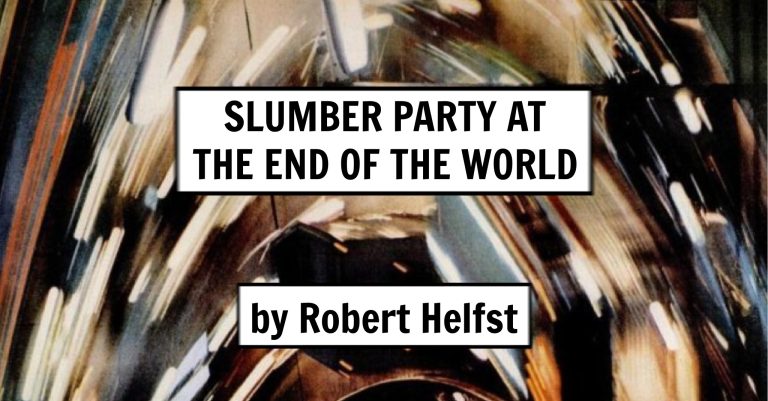
Micros
SLUMBER PARTY AT THE END OF THE WORLD by Robert Helfst
We’re nearly there now - lids grow heavy as the sun sets on our species. It’s bittersweet, sleep’s surrender, a warm blanket wrapping around our aching bodies. It’s better this way, a relief to embrace our conclusion without a coda, to no longer carry on. In the end it wasn’t cancer or rising oceans or mass extinctions or other self-inflicted harms but a deep fatigue that hollowed us until there was nothing left to do but rest, finally, now and forever. One last shared sigh, releasing the weight of our communal sins, and then the comfort of an unending slumber.
July 10, 2025

Fiction
NO NAME AND COOL PARTY by Erin Satterthwaite
No NameI looked at her picture to see if she was more attractive than me. I looked up her family’s ancestry to see if they had ever owned slaves. They hadn’t; they were quakers. I looked at the picture of my boyfriend and her when they were in Italy together. I had never even been to Italy and he knew this. Yet there he was four years ago eating gelato with her with his eyes closed and a big grin. He probably wouldn’t take me to Italy because I was dull and uncultured. She worked in academia at a fancy university and had degrees that I would never have. I worked as a preschool teacher and everyone thinks I just finger paint all day. I don’t, and we mostly use colored markers anyways. She was born in a city, a really important one. I was born in a town with no name. It did have a name, but it hardly deserved one. She was not prettier than me, but somehow that made it worse. She must be really special while I am just attractive. Being attractive isn’t special. Anyone would date someone attractive because they assume they're good at sex. I am not good at sex; I just lay there. She probably did really kinky stuff. Like finger stuff. I heard ugly girls do that to compensate. She was not actually ugly, but I needed to say that she was. It was all I had. Cool Party I had finally been invited to a cool party. I was wearing a long skirt. I couldn’t drink because I was on antibiotics so I ordered an apple juice at the bar because I thought it would at least look like a beer but the bartender handed me a bottle shaped like an apple. I was wearing a long skirt and drinking apple juice and everyone thought I was Mormon and they hated me. Nobody had said they hated me, but I could assume they did because nobody was coming up and talking to me. The most popular person at the party had invited me. He was talking to everyone else and everyone wanted to talk to him. I was alone in a corner watching a Youtube video on mute, which probably wasn't helping. Then someone came up and began talking to me. He asked about the Youtube video. I told him it was two really funny guys that play video games and he asked if I played video games and I said no because I didn’t play video games, I just liked watching other people do it. He excused himself and walked away. I was jealous of him because he could walk away. I finished my apple juice and went home.
July 9, 2025
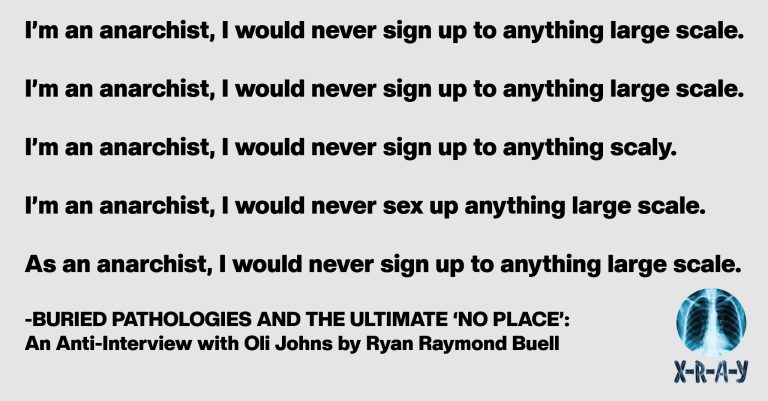
Interviews & Reviews
BURIED PATHOLOGIES AND THE ULTIMATE ‘NO PLACE’: An Anti-Interview with Oli Johns by Ryan Raymond Buell
How many people will read this interview? Will anyone read it? Will exactly three people read it—the writer interviewed, the editor interviewing, the publisher publishing … before a handful of thumbs sends it scrolling offscreen in their search for more content?—so much to read and digest, to form a perspective on … I can’t. I don’t have time. Just swipe to the bottom and see if it leaves a mark. It’s hard to know if I watched this or imagined it, but there is probably a cyberpunk anime where someone plugs a metal cord into their brainstem, and the data download is so huge blood trickles out their nostrils and they die, right there in their bedroom in front of the computer screen. Given the current size and capability of the human brain it seems impossible to read everything on the Internet. What if someone forced you to? What if you were then made to think deeply on absolutely everything you read? When someone thinks a thought that no one else has ever come close to thinking does the universe expand or become denser? What kind of instrument would be used to measure this? How much would it cost? Would it make living and working in a factory on the moon worth it? These are some of the kinds of questions I wish I had asked. Novelist and blogger Oli Johns refused an interview with me. “Ask me questions without asking any questions,” he said. “Let me answer using only lines from Ubik.” Here is our encounter, which took place via email.RYAN RAYMOND BUELL: Your blog [psychoholosuite.com] recently reached a milestone of ten years. What were your spacetime coordinates when you realized your physical existence would be forfeited for that of Psycho Holosuite? OLI JOHNS: 10 years is a farmer’s choice, my failure to grow corn and lemongrass at the same time and growing it anyway. 10 years. That’s the number I tell people in the market when they ask me how long I’ve been in Hong Kong, 10 not 18 cos 18 seems unreal. 10 years of slowly becoming nothing but a WordPress site. The novels may as well be burnt plastic. My Cantonese is quite decent. Is that what you want? I’m not comfortable with this at all. Glen Runciter is dead. Or is he? Someone died in the explosion orchestrated by the funniest SF writer of his time, a rabid anti-Communist, anti-Lemmist. He’s not dead. He can’t die. Ads recycle all. First story I ever wrote for Psycho Holosuite was about a guy coming back from the dead and becoming Psycho Holosuite. This was a mistake. MistAAAAke. The whole thing. Tsuen bo do hai gai. How do you feel about it as someone who once wanted to Exit Reality, who's been here for five minutes, who is not that supernaturalist?RRB: I feel adversarial about it, it doesn’t matter. I’m here to toe-test the waters for a new high, maybe drift intermittently on a friendly basis, we’ll see. But I appreciate the reference to my namesake. Question two: How does studying languages outside of English contribute to your penchant for reconfiguring small art-shaped swathes of reality? OLI: [To escape feeling too trapped by performance/dadaism, let’s put real stuff in brackets. Is everything going to be a question? [it doesn’t have to be]. My aim is to bury my real feelings amongst a lot of nonsense, most of it snatched from old notes, old work, your work, Ubik [as I said before], language guides, Cantonese soft sci-fi etc.] [let’s be desperate friends, not adversaries.]].: : : :When it comes to language, I’m skimming the pages, looking for another landscape with one mother and one threat. It doesn’t happen that often. My mother just wants to be left alone, for psychological reasons. She says she can speak French but I’ve tested her several times and now she’s gone. If she had stuck around, she would’ve understood that surrealism/absurdism hinges on [ ]. Language learning rides on the wing of that. In Cantonese, the spoken and written are often estranged from each other—you shouldn’t write out that which comes from the throat—so I accept that and shove idioms in. Hand write them like a primary school kid, scan them, remove the background [god willing, if there’s substance to it] and just shovel them into my work. It always makes sense despite this, despite me. To be honest, I’m only really competent in Cantonese, Japanese, French, Farsi, Portuguese, Slovene, Urdu, Swahili and Urdu. Six of those are make-believe. I read a book once. You put a guy from Pakistan in front of me, I’ll forget how to say ‘nothing.’ I can’t speak Urdu. The writing system is beautiful. Can’t speak French either, unlike every single person in the UK. Is this answering the question? Too artificial? At some point, this is going to get annoying and I want to stay on top of that. If you come to live in Hong Kong, locals will say, why aren’t you learning Mandarin? I feel contaminated by my choices. Another language I’m not fluent in is the occult. Sorry, Elytron [ and now [x]].Recently, I’ve started learning Yaqui.It all builds up into several thousand different ways of pretending you’re actually expressing yourself.Me a language?I’ve wanted to say this for a long time. In Perma Neon O, there was a page with an extract from Red Moon [Chinese sci-fi, erratic], fully written out in Chinese by my hand, aligned to the right, opposed by white space. It said something about me that no one will ever understand, even those who understand Chinese. Should I have deleted that?RRB: [I don’t see you as a true adversary. But the tone felt that way to me, which I honestly found exciting. But I agree, desperately colliding friends it is. Right now, the way I see it is that the interview starts with questions for the sake of form [there are also some actual thoughts I genuinely want to ask you about] but eventually your chaotic sense-destroying responses draw me into a helpless dialogue, the questions becoming other ends of an equation, or responses to your outputs, until the typical interview structure is imploded … ] [with this next one feel free to respond with simulations and nothing but, when it feels right I’ll respond in kind … provoking me a little might help with this, maybe by my fifth question I’ll have no choice but to give up asking things] What new genres of literature should be invented? OLI: [Never really thought about this before re: inventing genres].One of the below: modernism but 80’s but soft SF but more absurd but semi-real, something unafraid of aesthetics/faculty of association, prole stuff, my stuff, their stuff, Chinese stuff, xeno-esoterica, or not my stuff, I’m just copying Tyson Bley, though it looks like he’s moved on to shriek music now.I’ve moved locations, those kids were irritating.I’m not copying him, I just say it to ground myself.[Aren’t there enough genres already?]I subbed a beautiful picaresque to Solarpunk Magazine last year about an anarchist alone and miserable in the Kuiper Belt, and they didn’t like it. There’s hope in that. I’ll never sub anything to anyone ever again. Not sure they’re even a magazine. What I really wanna do is just keep scrawling out lines from Cinema II // Deleuze and superimposing them on screenshots from Santa Claws and Alienator and Mystics in Bali.[don’t think I have a good answer to this. Trying to analyse why I’m so uncomfortable in this process/reverting to absurdism. It’s not an interview but feels like it is. I’m afraid [terrified maybe] that one of these lines is gonna be extracted and framed in the promo-box, and without context, my work dies. Almost all work does].Is snuff a genre?Or is it core?Solar-, Cyber-, Modernist, aesthetic, synth-, steam-, hard-, soft-, there’s always a camera, always a Liz Short bisected into...this...kind of real out of artifice yet still not real, not even close.I’m Khleb-punk and here’s my manifesto: ‘Japan In White Guy.’[Karina Bush might be a genre, and that would be the end of her. Leave naming to others. Enjoy anonymity + hope it hurts].[you should keep these bits in, I think it might add something].[People want to be confused]RRB: [your responses are meaty and complicated enough that I feel unable to respond without sounding like a dick…I wonder if saying art dies without context is like needing genre conventions through which to view it, which is maybe why it’s difficult to imagine a new one without falling back on variations of what’s already here.][A lot of your work plays off genre, or uses it as a vehicle for what feels like an [un]selfconsciously permeable mind [yours?] open to any information it encounters, considering rejecting revisiting…maybe the thoughts happening in that mind would make no sense without the context of genre [sci-fi for KRV, Perma Neon O, etc.] but they would still exist as a puzzling artifact made out of typed [and scribbled] thoughts, which they seem to be already.] In your novel KRV, the narrator struggles to imagine utopian societies springing up on the dwarf planets of the Kuiper Belt, while in the far backdrop of the story, the 2019-20 Hong Kong protests are taking place. Bliss shifted into low gear—if we had regressed twenty, maybe thirty years the psychological spacewalks extended in a garish mask. “Please, Mr. Runciter.” Those green tumbled stones. The toaster dissolved as a sullen refrigerator perceived her breasts. [Hadn’t cracked my copy of UBIK for a long while. Feels good.]Utopia translates to ‘no place’—is outer space a suitable no place? OLI: I delayed replying to this [to watch Light Shop—not awful but rooted in melodrama, characters are ‘no thing’—with my wife] and lost about 14 good ideas in the process. Actually, I remember one of them, to lift lines from an interview Jung did about the afterlife just before he died and then doctor them a little. I won’t do that now, seems cheap somehow.Your ‘only shown/visible via existing genre conventions’ is very quantum. I don’t disagree. Why worry about inventing something new when you won’t really understand how it came about, where it originated from? I don’t think about ‘the new’ at all cos I have no marketing arm. Scrawling + scanning + shock collage are nothing new. My stuff is new in that no one’s put things in this exact order before. New is paralysing. New is elasticating. New new new new new noo new. KRV is old-new, basically a lost Barry Malzberg piece, a superior alternate to Galaxies, which I struggled with live in one section of KRV cos it performed itself as a new genre within sci-fi + nowhere else + did not go far or quantum enough. It felt playful, philosophical, not desperate or enraged. The first time I read it I never made it to page 98, the 3 cyborgs bit, which it desperately needed. I said ‘superior’ just now and maybe shouldn’t have, but I need to back myself + KRV is rooted in something real and intimate whereas Galaxies is not. Though parts of it lose me a little, parts of KRV, I mean. Some of the writing in the middle is sloppy, the notes can be repetitive past the line of tolerance etc. Last winter, I hated it in a vague way, from my memory of writing and editing it. This winter, it’s ‘pretty good.’ Does Galaxies loop itself like this? [I read that Malzberg has just died. You can delete this part, if you like. Maybe I’ll go and re-read Galaxies, give it more of a chance. Start on page 98, the 3 cyborgs. Should I? Can you will something to be better than it is? Other writers I respect adore it, adore Malzberg. Adore what exactly?]This is getting close to becoming a de-con-struc.Triton is the ultimate ‘no place’ for me to bury my pathologies on. Most of my work visits there at some point. Not visits, situates. [I didn’t know ‘utopia’ translated literally as ‘no place.’ Is that true? [I just checked, it is]. Does that mean ‘place’ is an innately degraded/degrading thing, cannot have replicators or Picard’s dream state? I could never write a utopia, only the failed attempt at one [due to my miserable psyche]. The Kuiper Belt is so tempting to superimpose that on as there are 10,000+ dwarf planets out there, one for each marginal ideology, and the huge distance gaps between them inconveniences imperialist gunships looking to “monitor” things...but also isolates colonists/private interests that could expand their psychopathy, and this is all make-believe anyway. There’s just something comforting about being on an icy moon away from subject-others who will eventually become object-others when my brain turns on me.Is Triton a genre? De-con-struc?That’s what my thoughts—I’m happy you’re reading Ubik again—look like without genre, probably a pathetic way of diverting fromRRB: [Imagining something that cannot be imagined has its appeal for me, though. Not new for the sake of it, but an actual ‘no place’ waiting to be revealed. [I still have religion in me.]Probably the only way to get there though—even tho it’s not possible—is through old methods newly ordered [ and even then it’s only new in that a baby or a cloud doesn’t exist until you see or give birth to one] … ][who knows what this is at this point, maybe I’ll delete everything except the brackets]I wondered about that, how ‘live’ the process of writing was compared to your parallel existence outside the book. KRV feels like a live blog plotted out via improv while the narrator [his name is Gulag?] is next to incapable of writing anything without endlessly outlining and restructuring his screenplay [his own thoughts] into what ends up feeling like a [maybe] permanent stasis. [VOID ROOM 9]You mention the difficulty of achieving this kind of non-development or regression of character at the end of your de-con-struc of I Saw the TV Glow. Is this where the desperation and rage ends up, forced to live? OLI: RRB: When I first encountered your work, I tried to understand the images. Now, I think I try and let them resonate. But it’s an interesting question, RE: trying to understand. It feels like an important part of your nature as a creator: What’s this guy’s internal monologue like anyway? Must have a non-stop de-con-struc going off all the time—brushing his teeth, chewing plant matter [vegetarian?], drawing spaceships—does he ever get a break? What is the relationship between your writing and your images? Do you see them coming from the same place? Ejaz was my favorite character in KRV. I’m glad he has a press named after him. What kinds of writing [besides notes-only novellas] do they specialize in? [You don’t have to answer any of these. I hope you know.]And lastly, is time travel possible outside of sci-fi? [Don’t worry, I think we’ve crescendoed…just need to find our way to a vanishing point.]OLI: [RE: 50+ Q's: you can always edit them in later, I don't mind].[I’m running out of ideas. Maybe I should try to be more direct, tell you about the time I nearly snapped my arm off while arm-wrestling? Or make up a story about killing a piglet? This is already genuine, I’m not masking—much of—anything].To be honest, I do not 100% understand what a noosign is, or a lectosign, but I still went ahead and used it in several of my novels. Or I did understand it and now I forget. Maybe no one understands it [100%].Talk about discipline?My shot at a cento [Black Hole Cento] had about 27 quotes and only 4 of them could be bothered to fit [into each other].Why would anyone do this to themselves?If I was shit at it, they must be too.I think it was Parmenides who said, people who go to Oxford and Yale are smart in an academic sense but can’t wrap a present properly, can’t interpret Total Recall without being told beforehand what it means by a superior interpreter [same with me and Lost Highway, I had to be led by the hand by KB Toys—Bill Pullman doubles as the devil, Patty Arquette is half-Thai surprise], can’t speak Cantonese, can’t do collage the way I can.[Time travel? I don't know]. I won’t be a pedant and say we’re travelling through time right now, or time is just a construct. I know what you’re asking of me. If it does/can happen, will there be chaos or a collection of master-editors trying to fix all incursions e.g. Timecop. If it can/does happen, it is happening now].Any philosophical insight I possess is purely accidental, I’ve barely read anyone + have no desire to.[I started writing this answer before you sent me the question. I’m sorry for putting us both through this, I thought it was a good idea but now I’m not so sure. Feels like I’m actively draining 2 separate brains. Was gonna mix in lines from interviews by Karina Bush + Gary J. Shipley + others, but now that I’m describing it...][On the other hand, I’m sure there are some good answers in here somewhere, just need to sift out the dirt].[My mood might be bad cos I got a rejection yesterday [my birthday!] from a sci-fi mag I have never read, a mag that pays. I need to make money out of this at some point].[RE: my brain: I know my friends don’t self-analyse/self-castigate like I do, but I assume at least some artists do/did. Don’t you [do it]? I know you said that, when writing Exit Reality, you wanted to disassociate from yourself/reality. Did you stop wanting to do that? Or did you succeed to a certain degree?RRB: [[[[Happy [belated] birthday!]]] I also recently got rejected from a sci-fi mag I have never read [one that pays]—within 24 hours of submitting, too. It felt refreshing to not have to wait six months, though.]Most of my writer friends are neurotic as hell. I’m no different. But your work seems unique in that those self-analyses and -castigations are almost a stand-in for narrative or a protagonist. That may not be the most accurate characterization of all your writing [I haven’t read everything], but it’s a mode that seems effortless, natural to you.I can imagine a novel from you that pushes this tendency to such extremes as to becomeutopic. [I feel like you’re kind of on fire at this point, I wanna give the black hole room to expand.]RE: money making: Would you take a job [well-paying] in which neuro and computer scientists study and map your consciousness while you do nothing but consume and create art, but their research helps addict billions of unborn children to destructive technologies? [This can be the last question[s].]OLI: The TV had receded back a long way; he found himself confronted by a dark, wood-cabinet, Atwater-Kent, tuned radio-frequency oldtime AM radio, complete with antenna and ground wires. God in heaven, he said to himself, appalled, elated. Just one more answer to try and hold it all together. But why hadn’t the TV set reverted instead to formless metals and plastics? I just remembered, a reporter for Ming Bo [Newspaper in HK] interviewed me about 16 years ago. Those, after all, were its constituents; it had been constructed out of them, not out of an earlier radio. He’d found a copy of The Atheism Jab [a collection of not very good short stories, my first stab at writing] in a local info-shop [now long gone] and wanted to know why someone would do that. Perhaps this weirdly verified a discarded ancient philosophy, that of Plato’s idea objects, the universals which, in each class, were real. Can’t picture what I said to him, it was too far back, but he did say afterwards that I sounded angry. The form TV set had been a template imposed as successor to other templates, like the procession of frames in a movie sequence. I hope I don’t sound that way today. Prior forms, he reflected, must carry on an invisible, residual life in every object. I hope I’ve managed to hide it a little, at least, or bury it deep inside the de-con-strucs. The past is latent, is submerged, but still there, capable of rising to the surface once the later imprinting unfortunately—and against ordinary experience—vanishes. Or it could be that I don’t hope that. The man contains—not the boy—but earlier men, he thought. Anger should drive me. History began a long time ago. Shouldn’t it?[Yes, UBIK, again. Without design. I randomly flicked, first time, to page 139 and the words were already there, awkwardly perfect. This is the satan-wave of experimentalism, I believe].Was the sci-fi mag [that rejected you] Clarkesworld? They have a fast turnaround. I must’ve been ‘rejected within 2 days’ around 50 times for them. I’m pretty sure I’ve tried everything, every type of story. You’ll never get in there, comrade. You'll never get past their network of AI elves. You = WE.[btw, I said I hadn’t read that other SF mag [that I got rejected from], but I do read stories sometimes, to see what kind of standard they’re looking for, that I can later fail to emulate. I liked one Clarkesworld story, by Kij Johnson, ‘SPAR’ [not the supermarket]. The rest-...I don’t want to rant. Just wish they’d loosen their guidelines a bit, or hire my mum as a first reader]. I'm an anarchist, I would never sign up to anything large scale.I'm an anarchist, I would never sign up to anything large scale.I'm an anarchist, I would never sign up to anything scaly.I'm an anarchist, I would never sex up anything large scale.As an anarchist, I would never sign up to anything large scale.I'm the Bye Bye Man, I would never sign up to anything large scale.I'm an antichrist, I would never sign up to anything large scale.I'm an anarchist, I would never sign up to anything like this.I'm an anarchist, I would never sign up to anything large scale.I love kids and they love me, the more unborn the better.If this is the end then thanks cos I would never speak like this in real life. No one would ask me.[RE: UBIK + random page: thinking back a bit, it wasn't that random, I knew the latter half of the book would have parts where objects and the environment started to regress to an earlier form, and I aimed for roughly that area. Within that, it was random [my second flick - the first didn't go deep enough]. Perhaps a neat example of my "method" overall]]]].[Ubik is great to read, I miss books like this]
July 8, 2025

by Mike Topp
$25 | Perfect bound | 72 pages
Paperback | Die-cut matte cover | 7×7″
Mike Topp’s poems defy categorization. That’s why they are beloved by seamstresses, pathologists, blackmailers and art collectors.
–Sparrow


